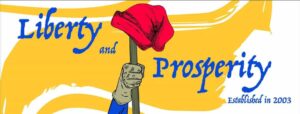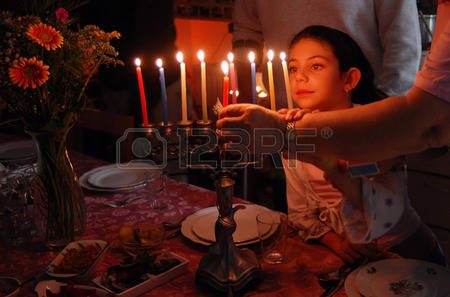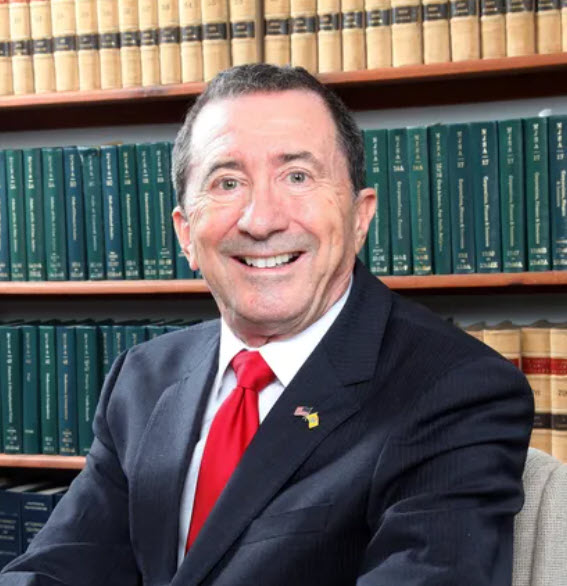The Jewish 8-day holiday of Hanukkah (Hebrew for “Dedication”) begins at sunset tonight, December 18. Hanukkah begins on a different day each year in our Roman solar calendar. However, it is always on the 25th day of the winter month of Kislev in the Jewish lunar calendar where each month begins with the New Moon. Is this coincidence? Or something more?
Two thousand years ago, Hanukkah was a major Jewish festival of miracles that inspired Jews and early Christians alike. Later, Jewish religious leaders suppressed and ignored both the holiday and the story behind it. Meanwhile, early Christians were inspired by it. It was early Christians who preserved the Hanukkah story by including the Book of Maccabees in their Bible when Jews excluded it from theirs.
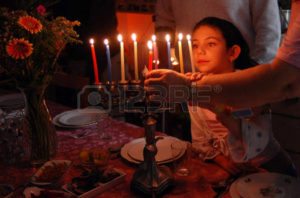
When I was a kid in New Jersey in the 1950’s, the holiday was usually spelled Chanukah with the “ch” pronounced “kh”. I was taught in Hebrew school that it was a minor holiday for Jews. My rabbi even criticized American Jews who made a big deal out of Hanukkah. He said they did it only to imitate Christians who celebrated Christmas during the same time of year.
In public school, I was embarrassed when “I Have A Little Dreidel” was sung along with one beautiful, inspiring, and majestic Christmas carol after another.
Hanukkah is not mentioned anywhere in the Jewish Old Testament. It is barely mentioned in the Jewish Mishna and Talmud, the two other sets of books that define and describe modern Judaism.
However, the complete story of Hanukkah is found in the Book of Maccabees, a book in the “Apocrypha” (hidden books) of Roman Catholic and Greek Orthodox Christian Bibles. That is because the Book of Maccabees and the Hanukkah story were among the sacred texts and books of prophets recognized by most Jews during the days of Jesus and the Apostles.
The English word “macabre” probably comes from the word “Maccabee. Plays telling the story of Hanukkah from the Book of Maccabees were often performed in Catholic churches during the Middle Ages. The Gospel of John (10:22) describes how Jesus preached in Holy Temple in Jerusalem during the Feast of Dedication (the English translation of Hanukkah). After his life was threatened, Jesus only seemed to visit the capital of Jerusalem (with its Roman soldiers and wealthy and powerful elites) during major holidays. That was the only time he was surrounded and protected by large crowds of common people from farms and small towns in his native Galilee.
Hanukkah is not like the Jewish holidays of Passover or Sabbath. There are no special synagogue services– a few sentences are added to the prayers in the regular daily service. It is a regular day of work and school. Jews light candles at home and praise God for “making miracles for our ancestors during this season“.
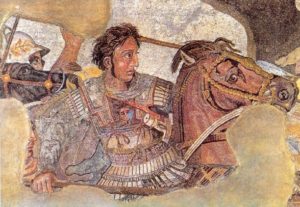
What were those miracles? The Jewish Talmud describes only one. When the Greeks were driven out of the Jewish Temple, there was only enough pure olive oil to keep the seven branch menorah lit for one day. However, that one day supply of oil miraculously burned for eight days, until new oil could be pressed.
The Books of the Maccabees in Roman Catholic and Greek Orthodox Bibles tell a much longer story with brutal and tragic details. The story begins when Alexander the Great is on his deathbed after conquering an enormous empire stretching from Greece and Macedonia in Europe, to Egypt in Africa, to India in Asia. Before he dies, Alexander divides his vast empire among his three top commanders, friends since boyhood. He gives Greece and Macedonia in Europe to one, Egypt to the second, and what was then called Asia, everything from what is now Israel and the entire Middle East to India, to the third.
About 150 years later, Antiochus, the Greek ruler of that big chunk of Asia, tried to become another Alexander by trying to conquer the other two sections of Alexander’s old empire. This Greek ruler was named Antiochus.
Antiochus tried to create one Greek empire with one ruler, one language, one culture, and one religion. He ordered every nation under his control to publicly worship Zeus and the other Greek gods. The people of every nation in his empire complied except the Jews in Judea, now known as Israel. Although Jews paid taxes and obeyed all other laws, they stubbornly clung to their Bibles and religion. They refused to work or compete in athletics on Sabbath, refused to eat pork, and refused to offer sacrifices to the Greek gods. They also continued to circumcise their sons.
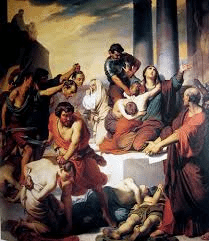
The Greek emperor Antiochus then ruled that the Jewish religion was subversive, and had to be eliminated. Antiochus and his officials declared that any Jew found teaching the Bible, or having one in his or her home was to be tortured and killed. So was any Jew who circumcised his or her sons, refused to work or compete in games on the Sabbath, eat pork, or sacrifice to Greek gods.
The Book of Maccabees tells of Eleazer, an elderly philosopher who was respected in the Greek community. He was ordered to publicly eat pork, and set an example for the rest of the Jewish community. He refused and was arrested and beaten. Later, he was offered al chance to save his life by just publicly eating kosher meat said to be pork. Eleazer also refused to that. Greek soldiers then tortured him to death. They stripped his skin off with sharp instruments, and burned him alive.
The Book of Maccabees tells of a woman named Hannah. Greek solders arrested her and her seven sons and brought them to the Emperor. One by one the sons were ordered to publicly eat pork. One by one, each of them refused. One by one, their tongues were cut out, then their arms and legs were cut off. Finally they were thrown into pans of boiling oil. After all seven of her sons were tortured and killed in this way, Hannah was tortured and killed in the same way.
If any infant boy was found to be circumcised, the baby and mother were killed, and the bodies were publicly displayed with the body of the dead baby tied to his mother’s neck.
Slowly, Israel’s leading citizens began to comply. This included many priests, the “Kohans”. It seemed as if the Jewish religion was doomed. However, one priest named Mattityahu (Mattathias or Matthew in English) Hasmoni escaped from Jerusalem, together with his five sons. They fled to a small nearby town named Modin. Later they hid in caves in the desert. They learned, taught, and practiced military skills and tactics. They learned how to make swords, spears, shields, armor, and other weapons of war. Then they fought back against the Greeks. They attracted thousands of followers, and soon became known as “The Hammers” (“Maccabees” in Hebrew). 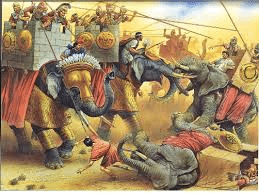
The Maccabees offended many traditional Jews. The Maccabees surprised the Greeks by disregarding the Bible law against working on the Sabbath, and fighting on the holy Day of Rest. (The Maccabees explained that God commanded Jews to live by His laws in the Bible, not die because of them.)
At first, the Maccabees used hit and run tactics to ambush larger Greek formations like the Americans at Lexington and Concord. However, the Jews later fielded full armies and defeated the Greeks in conventional pitched battles like the Americans after Valley Forge. Like the Americans had Valley Forge, the Jews patiently drilled and trained. They mastered the military skills and tactics of professional soldiers. One of them was forming and maneuvering the then invincible Greek phalanx. That was a formation where hundreds of soldiers with long spears marched and and held their shields together with perfect discipline and precision to block enemy enemy swords and arrows.
The Maccabees also sent ambassadors to Italy and negotiated a military alliance with the non-Jewish Roman Republic. The Maccabees forced the Greeks to face a multi-front world war against Rome and its allies, rather than the rebellion of one small Jewish province. The Greeks were forced to divide their forces.
After years of struggle, the Maccabees won, and drove the Greeks out of Jerusalem. Most Jews celebrated the survival of the Jewish religion as the miracle of Hanukkah.
The Maccabees then became kings of an independent Jewish kingdom. This also offended Jews who believed only a descendant of King David from the tribe of Judah could be king. The Maccabees were from the priestly tribe of Levi. For centuries, Jewish tradition did not permit priests to be political leaders.
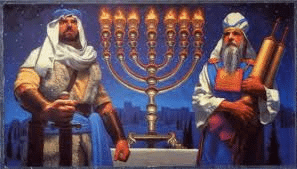
One hundred years later, two spoiled great-grandsons of the Maccabees ruined the miracle of Hanukkah. While fighting with each other over who should be king, one invited Pompeii, the commander of a nearby Roman army to help. Pompeii marched his army into Jerusalem and instead made Israel another conquered Roman province.
Later, Jews inspired by the Hanukkah story rebelled against Rome three times. During these rebellions, time, there were no miracles. The Romans destroyed the Jewish Temple and all Jerusalem. They sold hundreds of thousands of Jewish men, women, and children as slaves throughout the Roman Empire. The Romans even gave the ruined Jewish province a new name — “Palestine”. The Jewish land of Israel was now named after the Philistines — the ancient Biblical enemies of Jews During this time, Jewish leaders blamed these rebellions on “causeless hatred”, and excluded The Book of Macabees, and its stories of Hanukkah from the Jewish Bible.
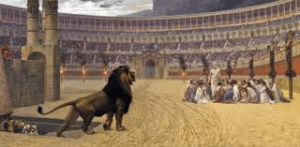
Ironically, early Christians were inspired by the Hanukkah stories that so many Jews wanted to forget. During the year 64, the Roman Emperor Nero declared Christianity to be a subversive religion. He tried to wipe out Christianity just as the Greeks previously tried to wipe out Judaism. For the next 300 years, Roman soldiers arrested, tortured, and killed Christians throughout the Empire who refused to renounce their faith. Some were covered with tar and burned alive as human torches. Others were fed to hungry lions in stadiums before cheering crowds.
Those early Christians kept their hope alive by remembering how God redeemed the Jews from the Greeks hundreds of years earlier. They kept Book of Maccabees in their Bibles.
The Jewish holiday of Hanukkah is celebrated on a different day each year in the Western Calendar. However, it always celebrated on the 25th day of the month of Kislev, the first winter month in the Hebrew calendar. Each month of the Hebrew calendar starts with the new moon and has 29 or 30 days. To catch up with a calendar based on the yearly cycle of the sun, a 13th month is added to the Hebrew calendar every few years. That is why Jewish holidays determined by the Hebrew calendar based on the moon’s monthly cycle fall on different days each year on our Roman calendar based on the sun’s yearly cycle. The New Testament does not specify the day Jesus was born. However, roughly 300 years later, Christians began celebrating the birth of Jesus on the 25th day of the first winter month of the Roman calendar. Coincidence? Or something more?
LibertyAndProsperity.com is a tax-exempt, non-political education organization of roughly 200 citizens who mostly live near Atlantic City, New Jersey. We formed this group in 2003. We volunteer our time and money to maintain this website. We do our best to post accurate information. However, we admit we make mistakes from time to time. If you see any mistakes or inaccurate, misleading, outdated, or incomplete information in this or any of our posts, please let us know. We will do our best to correct the problem as soon as possible. Please email us at info@libertyandprosperity.com or telephone (609) 927-7333.
If you agree with this post, please share it now on Facebook or Twitter by clicking the “share” icons above and below each post. Please copy and paste a short paragraph as a “teaser” when you re-post.
Also, because Facebook and Twitter falsely claim our posts violate their “community standards”, they greatly restrict, “throttle back” or “shadow ban” our posts. Please help us overcome that by sharing our posts wherever you can, as often as you can. Please copy and paste the URL link above or from the Twitter share button to the “comments” section of your favorite sites like Patch.com or PressofAtlanticCity.com. Please also email it to your friends. Open and use an alternate social media site like Gab.com.
Finally, please subscribe to our weekly email updates. Enter your email address, name, city and state in the spaces near the top of our home page at Homepage – Liberty and Prosperity. Then click the red “subscribe” button. Or email me at sethgrossman@libertyandprosperity.com or address below. Thanks.
Seth Grossman, Executive Director
LibertyAndProsperity.com
info@libertyandprosperity.com
(609) 927-7333
